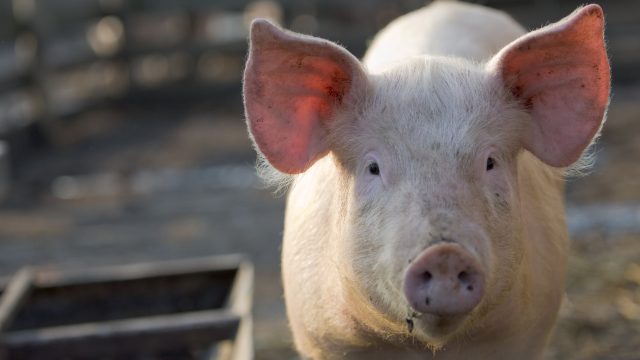
Where Are They Now? Natalie Prosin
 Among ALDF’s many efforts to support the field of animal law is our growing network of Student Animal Legal Defense Fund (SALDF) chapters on law school campuses throughout the U.S. and Canada. SALDF chapters provide a forum for education, advocacy, and scholarship, aiming to protect the lives and advance the interests of animals through the legal system. In this continuing series of updates on former SALDF members, ALDF is proud to spotlight Natalie Prosin.
Among ALDF’s many efforts to support the field of animal law is our growing network of Student Animal Legal Defense Fund (SALDF) chapters on law school campuses throughout the U.S. and Canada. SALDF chapters provide a forum for education, advocacy, and scholarship, aiming to protect the lives and advance the interests of animals through the legal system. In this continuing series of updates on former SALDF members, ALDF is proud to spotlight Natalie Prosin.
No one will ever accuse Natalie Prosin of being an underachiever. Natalie—who graduated summa cum laude from Northeastern University in 2005, holds a masters degree from Brown University, and earned her JD from Boston College Law School in 2011—has already landed a plum job as the executive director of the Nonhuman Rights Project. “The mission of the Nonhuman Rights Project is to work through education and litigation to change the common law status of at least some nonhuman animals from mere ‘things,’ which lack the capacity to possess any legal right, to ‘persons,’ who possess such fundamental rights as bodily integrity and bodily liberty, and those other legal rights to which evolving standards of morality, scientific discovery, and human experience entitle them,” explains Natalie, who oversees the organization’s day-to-day operations, manages volunteers and working groups, and develops and implements strategic plans. “I maintain a working knowledge of significant developments and trends related to animal rights and the specific animals on whose behalf we will be advocating.”
To appreciate how Natalie could find such an ideal position so soon after earning her law degree, you need only consider what she achieved while at Boston College. Within her first semester, Natalie had contacted Nicole Pallotta, student liaison for ALDF’s Animal Law Program, and with her help established the Boston College Law School Chapter of the SALDF. “After I’d recruited other interested students,” says Natalie, “we thought a good first project for the group would be to get out the vote on a state ballot initiative that would ban all greyhound racing. We set up a table in the cafeteria during lunch time and handed out literature to students, professors, and administrators about the inhumane practice of greyhound racing, urging them to vote to ban it.”
The following year, their SALDF chapter initiated a cage-free egg campaign for Boston College’s food services. “We met with administrators and chefs, and struck a deal to use cage-free eggs for six weeks. If diners did not object to the potentially different taste or the small increase in price, they would consider permanently switching their shelled eggs to cage-free eggs.” During the six-week trial run, Natalie and her fellow SALDF members set up a table in the cafeteria and handed out literature on the inhumane practices of battery-cage facilities, as well explaining the environmental concerns linked to industrial-sized battery-cage facilities. They also displayed an actual battery cage from a factory farm, which helped demonstrate the confined conditions egg-laying hens live in, along with the wire they must stand on for their entire lives. “We collected hundreds of signatures from students, professors, administrators, and deans, asking that Boston College permanently switch to cage-free eggs. At the conclusion of the trial run, we received the good news that Boston College would be implementing a cage-free policy for all their shelled eggs in all four cafeterias and catering services.”
Natalie also successfully petitioned the school to ensure that an animal law class would be taught during her time at the college.
In the meantime, Nicole, impressed with Natalie’s dedication, had forwarded her resume to Steven Wise, president of the Nonhuman Rights Project, which secured her an ALDF Animal Law Clerkship in conjunction with the Nonhuman Rights Project between her first and second, and second and third years of law school. “My role as legal researcher slowly began to grow semester by semester, and I went from conducting original legal research to managing small groups of other law student volunteers with their projects. Steve would often bring me in on strategy calls to discuss the future of the organization’s work.” To top it off, ALDF awarded Natalie a grant to attend the 2009 Animal Law Conference at Lewis and Clark Law School. “I am very grateful for all the support that ALDF gave me as a law student, which nurtured my passion for animal rights,” she says.
Natalie has had several mentors along the way, including Zygmunt Plater, professor at Boston College Law School. “All throughout law school, he was enthusiastic about my interest in animal law and was a constant cheerleader as I pursued my passion. He helped me petition administrators to ensure animal law would be taught while I was a student at Boston College. He was a constant source of support both academically and as a rising legal professional.” She is also grateful to Michael Mountain, who she says has been a tremendous source of support and inspiration. “Michael is the former president and one of the founders of Best Friends Animal Society, and continues to help us at the Nonhuman Rights Project,” Natalie says, adding, “Of course, I would be nowhere in this field today without the constant guidance of Steven Wise.”
Full of enthusiasm for her field, Natalie is quick to offer a few suggestions for anyone interested in pursuing a career in animal law. “If you are currently a law student and are interested in professionally pursing animal law, I would recommend expanding your studies to include other areas of law that would be applicable to animals, such as environmental law, administrative law, trusts and estates, and business law. Animal issues can be related to virtually any class in law school. Whenever you take a class that offers an opportunity to write a paper, focus your research on something related to laws that affect animals that you may not discuss in your animal law class. Second, I would recommend pursuing as many opportunities as possible: internships, volunteer positions, or other opportunities that you create yourself. If there is an organization that you are interested in that does not have anything listed on their website, inquire about whether they could use your services.”
Her final piece of advice goes to all those practicing lawyers out there: “I highly recommend joining ALDF’s Animal Law Program. They provide wonderful pro bono opportunities. Moreover, find out if your state bar has an animal law section or committee. If it doesn’t, then start one!”
How We Work
Recent News
-
Court Rules Texas Food Label Censorship Law is Unconstitutional
The law imposed unclear and vague standards on plant-based meat producers that violate the First AmendmentJanuary 29, 2026 Press Release -
Defend the Big Cat Public Safety Act
Urge your federal representative to oppose H.R. 7159, which aims to undo protections established by the Big Cat Public Safety Act, including by creating exemptions allowing direct contact with big cats, such as cruel cub petting. -
State Animal Protection Laws Ranked: Oregon is #1, North Dakota #50
20th edition of ALDF state and territory ranking report highlights major advancements & trends in animal protection across the U.S.January 27, 2026 News



